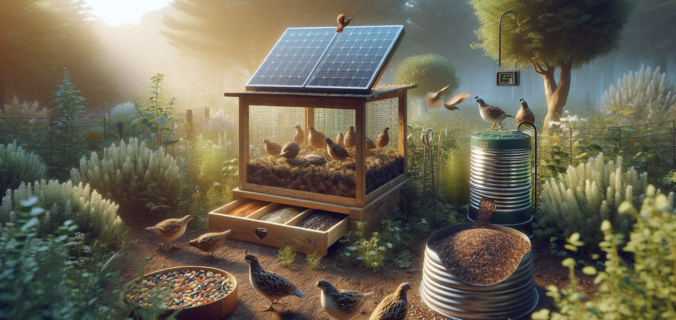If you’re passionate about sustainability and eco-friendly living, you’re in the right place. In this blog post, I’m excited to share some personal insights and tips for practicing sustainable quail keeping in your backyard. From reducing waste to minimizing environmental impact, there are plenty of simple and effective ways to ensure that your quail keeping practices are good for both your flock and the planet. So, let’s dive in and explore how you can become a champion of sustainable quail keeping!
1. Start with Sustainable Housing:
When it comes to sustainable quail keeping, it all starts with the housing. Opt for eco-friendly materials like reclaimed wood or recycled plastic for building your quail coop or cage. Consider incorporating energy-efficient features like solar-powered lighting or ventilation to reduce your reliance on traditional power sources.
2. Embrace Natural Feeding Practices:
Next up, let’s talk about feeding your quail. Embrace natural feeding practices by offering your quail a diverse diet that includes locally sourced grains, seeds, and greens. Consider growing your own feed or sourcing from local farmers to reduce the carbon footprint associated with transportation.
3. Reduce, Reuse, Recycle:
Reduce waste and minimize your environmental impact by adopting the three Rs – reduce, reuse, and recycle. Use recycled materials for bedding, nesting boxes, and other quail supplies whenever possible. Repurpose items like egg cartons or plastic containers for feeders and waterers to minimize waste.
4. Practice Water Conservation:
Water is a precious resource, so it’s essential to practice water conservation in your quail keeping practices. Install rainwater harvesting systems to collect and store rainwater for quail drinking and bathing. Use drip irrigation or low-flow watering systems in your garden to minimize water waste.
5. Compost Quail Waste:
Turn quail waste into nutrient-rich compost for your garden by composting bedding, droppings, and other organic materials from your quail enclosure. Compost provides valuable nutrients for plants and helps reduce the need for synthetic fertilizers, closing the loop on waste and promoting a healthy ecosystem.
6. Practice Integrated Pest Management:
Minimize the use of chemical pesticides and herbicides in your quail enclosure by practicing integrated pest management (IPM). Encourage natural predators like birds, insects, and beneficial microbes to control pests and maintain a healthy balance in your quail habitat.
7. Support Biodiversity:
Create a biodiverse habitat for your quail by planting native vegetation, shrubs, and trees in your backyard. Native plants provide food and shelter for quail and other wildlife, promote pollinator populations, and contribute to overall ecosystem health.
8. Educate and Advocate:
Share your passion for sustainable quail keeping with others and advocate for environmentally friendly practices in your community. Educate fellow quail keepers about the importance of sustainability and encourage them to adopt eco-friendly practices in their own backyard flocks.
Conclusion:
Sustainable quail keeping is not only good for the planet but also for your quail and your community. By adopting eco-friendly practices like using sustainable materials, embracing natural feeding practices, and practicing water conservation, you can reduce your environmental footprint and create a healthier, more sustainable future for generations to come.
So, whether you’re a seasoned quail keeper or just starting out, why not make sustainability a priority in your backyard flock? With a little creativity, dedication, and a commitment to sustainability, you can become a champion of eco-friendly quail keeping and make a positive impact on the world around you. Here’s to sustainable quail keeping and a brighter, greener future for all!
